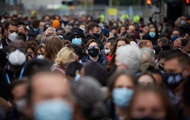The SARS-CoV-2 coronavirus continues with us for another year, although, modulated by the effect of vaccines, with the incipient arrival of the omicron variant, more transmissible. Comparing December 2020 with December 2021, we observe that in the Canary Islands the new positives are almost 700% more, with 49,607 cases reported (most omicron) due to the 6,260 infections in 2020 (majority Alpha). For their part, the deceased increased by 7%, going from 87 in 2020 to 93 in 2021, due to the last terrible days with more than twenty deaths. The arrival of the vaccine, which began to be administered on December 27, 2020 in the Canary Islands, has meant dealing with the most serious cases of the disease, COVID-19. The head of the Epidemiology Section of the Public Health area of the Ministry of Health of the Government of the Canary Islands, Amós García, points out, in this interview with DIARIO DE AVISOS, that omicron has caught everyone “with a changed foot”, but vaccines are still effective.
-What do you think of the latest numbers of infections in the Canary Islands?
“Ómicron has caught everyone on the wrong foot. No one expected a variant to arrive with this transmitting capability. A variant that comes from multiple mutations and, of course, there are gaps in its knowledge, but the aspects that are already known tell us that it has a bestial propagation capacity. When the Delta variant appeared, it was said that it had a high contagion power, but this variant has four times more capacity than Delta, and this contagion speed is what is making it possible for most countries to suffer brutal incidents that are not they are accompanied by many serious cases, not so many deaths, mainly due to vaccines. We still have to wait to be clear that it is lighter than other variants. I think it is reasonable to think that the upward path in the Canary Islands will continue until the middle of January, because these days we tend to relax, social contacts and, therefore, infections. We were worried about the December weekend and the meals of friends and companies, and contagions exploded in our faces. Now, we will see the meals on Christmas Eve, New Year’s Eve, New Year’s Eve and Kings how they are going to impact us, but it is possible that they will continue on the current path, so very probably until the middle of January we will continue with a significant number of cases ”.
-What do you think about the incidence in Tenerife in 14 days exceeding 2,400 points?
“The growth has been spectacular and indicative of omicron’s tremendous transmission capacity. Hopefully, if all goes well, the descent will begin in the third week of January. We are enduring a brutal Cumulative Incidence, but last year, with much lower cases than the current ones, we had more deaths and hospitalizations in ICU. Now multiplying by 12 on this same date, and they are lower which indicates that the vaccines work. Ómicron has almost completely displaced Delta and circulates with great intensity in the Canary Islands. If Delta had a high contagion power, Ómicron multiplies the contagion power of the previous variant by at least four. The same pattern as in Delta has been repeated. The first major impact has been in Tenerife, because the infections began earlier, but the rest of the territories will not be exempt from the expansion of cases as a result of their greater transmission ”.
-Hospital and ICU admissions stabilize.
“It seems that it is not as serious as the Delta, but the cases studied in South Africa were young people whose clinical impact is milder. In countries like Spain, another factor that will influence is vaccination. There is a large vulnerable population protected with a complete vaccination schedule and a third booster dose, which should mean that omicron has less hospitalization in the ICU. Scientific works speak that it remains in the upper part of the respiratory tract and it would behave in its symptoms like a strong cold. But we must wait, we know that it is highly contagious, we must continue evaluating it. It translates into many asymptomatic and mild, but what is happening is that as it is more transmissible, proportionally there will be more infections and more hospitalizations will arrive. Now it is in Primary Care where they are having a hard time with the arrival of people with flu, colds, possible coronavirus infections to carry out PCR tests, child vaccination and monitoring of isolates (more than 40,000). I think the key is to vaccinate and vaccinate, there are people still without receiving the first dose, others without the booster dose, there is still more than 65% of the population under 11 years of age without vaccinating. We must continue to insist on the use of a mask, hygiene, maintaining physical distance and, above all, the ventilation of the rooms. There are four key elements, whatever the variant of the coronavirus. The vaccine is not preventing infections and contagion, but it achieves something prodigious, avoiding the bitter face of ICUs and deaths. It does not prevent you from becoming infected and transmitting the problem to another, but yes, with a much lower viral load, and if I suffer from the disease, it will be very mild or asymptomatic “.
-We celebrate the anniversary of vaccination in Spain and the Canary Islands. How do you remember it?
“The vaccination of Araceli, at the national level, and of Doria, in Tenerife, were indelible images and I remember them with emotion. Tears came to my eyes as I witnessed the beginning of the end of the nightmare. Starting to vaccinate in residences had a positive impact since the highest number of deaths occurred in this group, and now they are well protected. There are things that have been done well in Spain and its vaccination policy leads the world in vaccination. The result, first of all, of the magnificent health professionals, and secondly, of a very mature and conscientious citizenry, which has paid attention to scientific discourse. I am satisfied that the vaccination has been done in an adequate way, prioritizing the most vulnerable, the severe risk profile for infection. Vaccines represent a turning point when facing the pandemic because it has made it possible to have an instrument that avoids the terrible and dramatic face that the pandemic has had, which are those linked to serious admissions and deaths. Last year at this same time we had a number of cases much lower than the current one, however, the number of hospitalizations, ICU and deaths was similar to the current one, when the number of cases has multiplied by 12, that is a sign that we have of a very powerful instrument ”.
-Are vaccines still effective against omicron?
“I believe that vaccines help and we are reasonably protected and safe from the serious forms of the disease. Everything indicates that there will be efficiency against omicron. I hope there is no need to revaccinate soon [como ya propone Israel] and only to the vulnerable population. If you continue to avoid the serious forms of the disease, we are in a position to control the pandemic ”.
-Delta and omicron were born in countries and continents with a low vaccination rate. The world problem is still latent.
“Indeed, the virus continues to roam freely because developed countries have looked at each other in the navel, we have tried to protect what is ours, but we must all get out of this pandemic together. Today developed countries account for 60% of vaccines, which increases the unbearable gap between rich and poor countries and we prevent them from being able to vaccinate their population. The WHO created the Covax project for the centralized purchase of vaccines, but it has been greatly devalued. Countries must donate vaccines to this project or to other countries through bilateral agreements and relationships. The sensible thing is to strengthen donations and achieve more affordable prices for those countries ”.
-Isn’t a contradictory message being given to society now with the use of the mask abroad?
“Before it was already said that its use abroad was necessary if social distance was not maintained or respected, but with relaxation, some did not comply. Those of us who live or work in urban centers know that it is difficult to keep our distance and we always carry it. The discourse must be common and sensible, and perhaps it has not been consistently given to the public. We can modify the scientific evidence, but decisions must be clearly explained ”.
–


